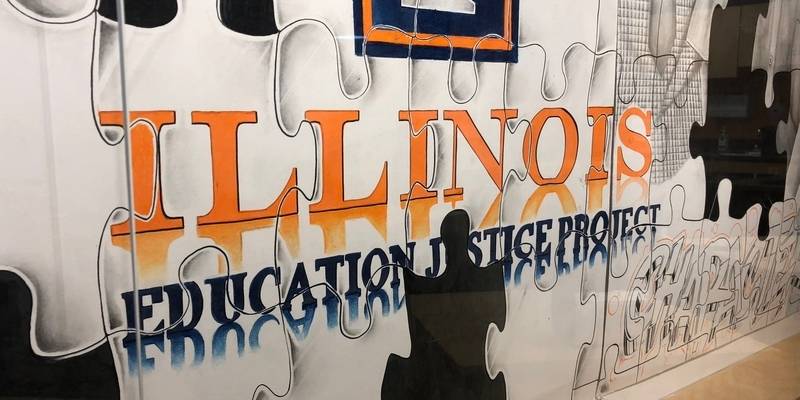In 2010, Common Ground Food Co-op began their Round Up for Good program in response to the earthquake in Haiti. It’s a simple concept; customers are asked if they would like to round their purchase totals to the next dollar, and that change is set aside as a donation. Their initial success inspired the co-op to continue the program on a monthly basis and focus their intentions on local organizations that align with the values of the co-op. To date they have raised more than $175,000 from spare change. This February, their Round Up organization was the Education Justice Project, which operates within the Danville Correctional Center and provides an opportunity for the inmates to take college courses for University of Illinois credit and participate in other educational endeavors. According their website, “EJP is a vibrant academic community of incarcerated students, educators, formerly incarcerated individuals, family members of the incarcerated, and others who are committed to more just and humane world, achieved through education and critical awareness.” For the co-op, the EJP was a logical choice for the Round Up program. “An inclusive vibrant community is one of our main ends,” says Sarah Buckman, Outreach Coordinator for Common Ground, “EJP not only serves the students that they’re working with, but they also have resources for families, anyone who is affected by being personally incarcerated or are affected because of the people that they love.”
This partnership went beyond the usual routine of banking spare change and sharing information about the supported organization. Common Ground’s art gallery space was available, so a group of students from the EJP collaborated to produce a mural for display. “There’s such a great feeling knowing that the students from EJP know that their artwork is being shown right now, says Buckman, “The fact that they can’t see it is really powerful in a way. EJP is doing a lot of work to cover all different areas of education and also empathy. It’s really poignant to see their work, because it really show the faces and the art of those who are unseen and unheard. It’s giving voice to those who aren’t always given a voice.”
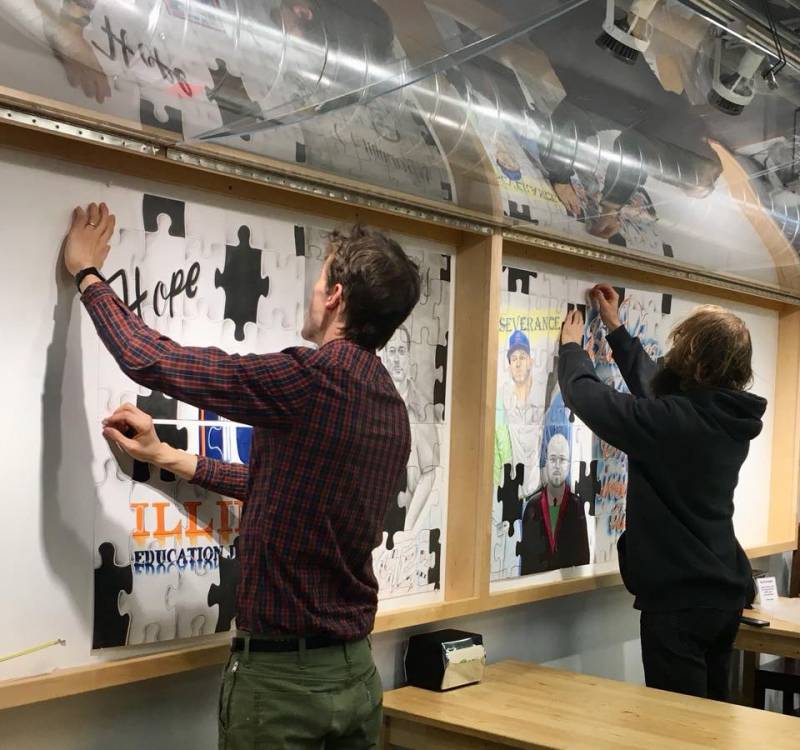
Bert Stabler (at left), a Ph.D student in art education and volunteer for the EJP echoes that sentiment. “The entire communities incarcerated people come from tend to be invisible.” He’s seen that first hand. Prior to coming to UIUC, Stabler was an art teacher in Chicago Public Schools. “I worked with kids who had parole officers, kids who were in and out of facilities, kids whose family members were incarcerated. It was a big part of the culture where I was teaching.” Those experiences led him to work with the EJP. He’s had interest doing some kind of art show with students in the past, but the timing didn’t seem to work out. According to Stabler, “what you ask for and when is very delicate with prison administration.”
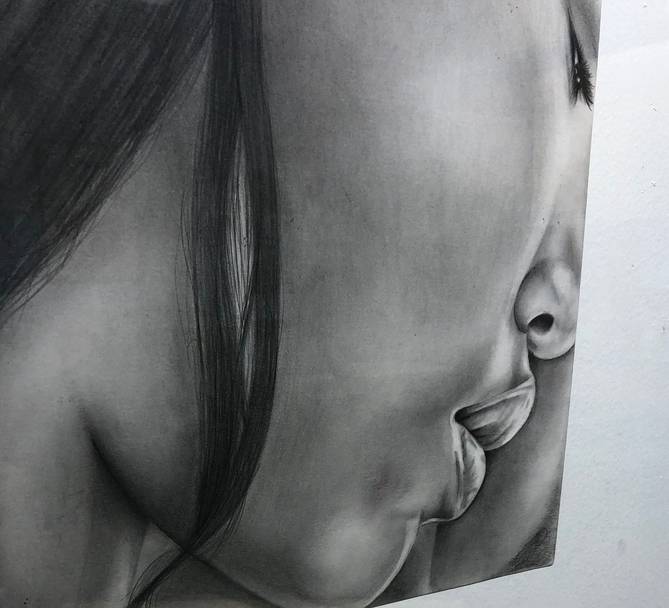
Stabler had the opportunity to sit in on early planning sessions for the Common Ground mural, where James Wood, an EJP student, took the lead. He specializes in drawing portraits, so he created that portion of the mural while coordinating the project and assigning other students tasks. He also came up with the puzzle piece concept. Other students contributed the texts, shading, background, and color, depending on whatever their individual talent was. The EJP provided paper and erasers, but all other art supplies were items that the men had purchased through the commissary over their years in Danville. These are students who have been active artists during their time in prison.
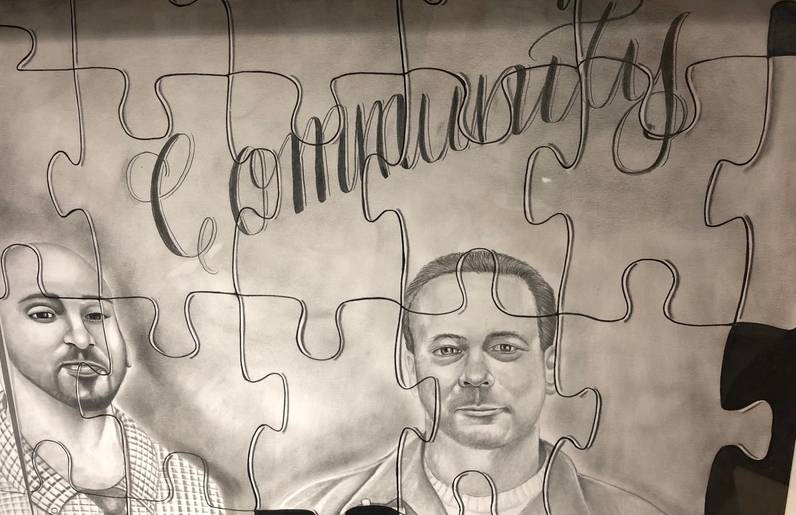
Stabler spoke about working with the men in the EJP. “They have the level of reflection, reading, and concentration that advanced students have. On the whole they are more articulate, they’re more well read, more scholarly in most respects than most people who don’t spend all of their time talking and thinking and reading. These guys are intellectuals. They’re really fun to talk to, they’re really thoughtful, they’ve seen a wide swath of the world that not everyone has seen, but they’re also reflective about it in a way that’s impressive. You think they’re tough and scary, and they are tough, but what’s scary about a lot of them is how smart they are.”
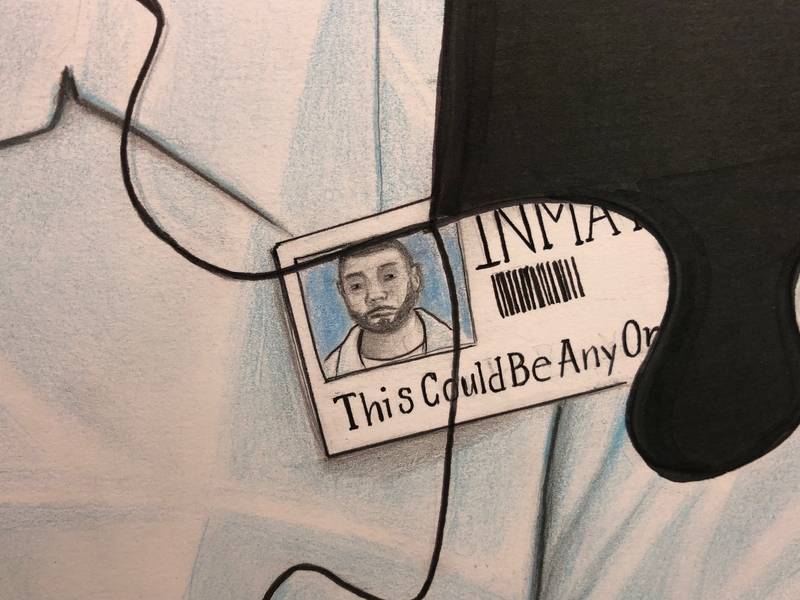
We live in a nation with high levels of mass incarceration relative to our population, and in Illinois and elsewhere it disproportionately affects African-American and Latinx communities. Often families have multiple members in prison or on parole. “There’s so much effort and work involved in dealing with this additional burden that affects so many families,” says Stabler. “Just having family members locked up then having a hard time getting work or getting back into school or integrating back into society because they have the stigma of being formerly incarcerated, and also many folks come from trauma to start with and then they are re-traumatized in prison.” However, he sees positives within families that are affected by incarceration. “Not a lot throws them. People pay attention to each other, and they’re not focused on themselves so often. It’s kind of nice. There’s a lot to be gained by engaging in communities that carry the burden of incarceration and learning more about them.”
And that is what the EJP and Common Ground hope to accomplish by displaying this mural in the gallery, and through conversations with EJP volunteers. There’s an opportunity here to see beyond the pasts and presents of these men and realize their capacity to contribute to the community. Buckman puts it this way: “This is something that the artists will see as a positive connection to their community. Knowing that they are wanted. We want them to be showing their art, and we are taking the time and showing that we care.”
The mural will be on display through mid-March. To learn more about the Education Justice Project, you can visit their website, follow them on Facebook, or check out their newsletter. This video gives you a glimpse into how the organization is affecting lives.
Common Ground raised over $4000 for the EJP during their February Round Up. To see which organizations they are supporting in 2018, you can visit their website.
Installation photo from the Education Justice project website. All others my own.








